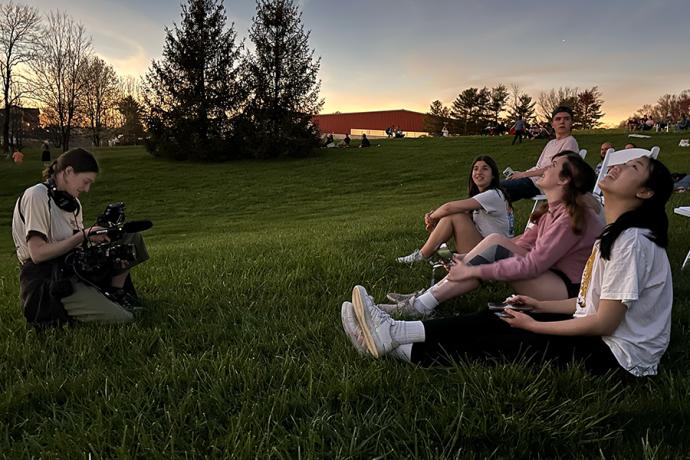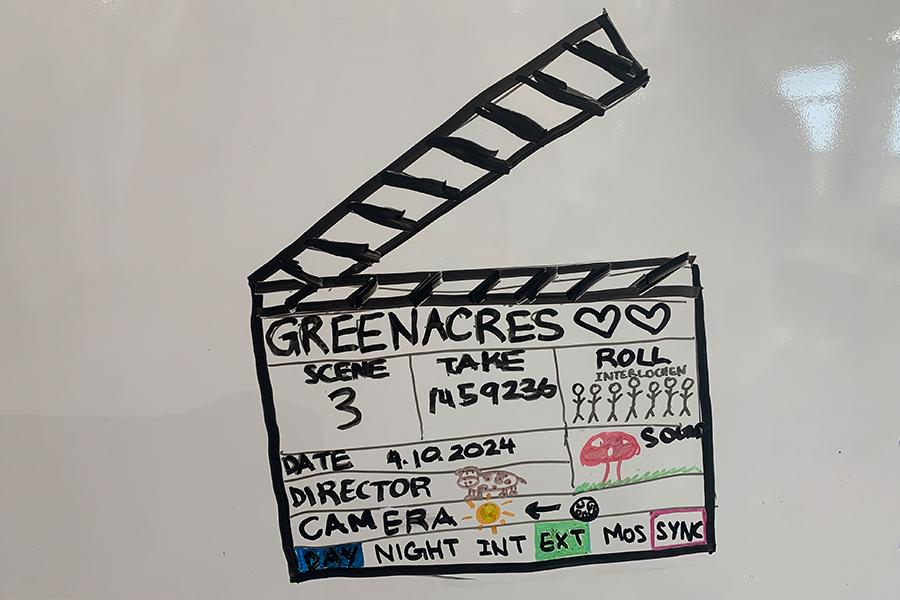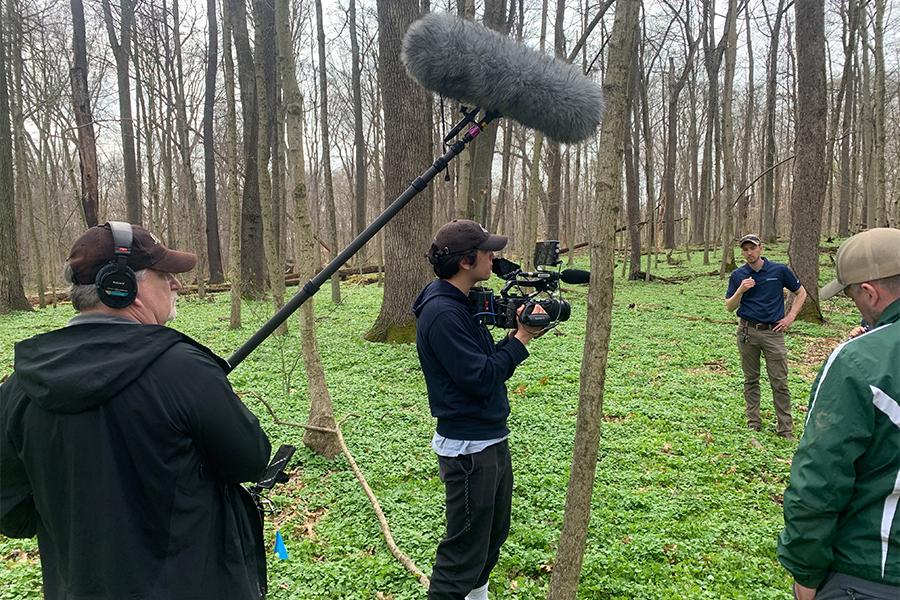Exploration and evolution: Greenacres documentary begins production in northern Michigan and beyond
Project Manager Claire Collins shares an update on Interlochen Arts Academy’s documentary on regenerative agriculture.

Arts Academy students watch the eclipse at a Greenacres-operated farm in Indiana.
On April 8, 2024, ten Interlochen Arts Academy students experienced the total solar eclipse from a farm in Indiana.
The students’ presence in the path of totality was a coincidence—an unexpected yet exhilarating outcome of their visit to the Ohio-based Greenacres Foundation to capture footage for a feature-length documentary on regenerative agriculture.
“The eclipse was a magical moment of the trip,” says Claire Collins, who serves as project manager for the documentary. “It was a really fun and amazing way—symbolically and literally—to align ourselves as a group. It was also a cool moment of connecting to the natural world and appreciating that we really are on this tiny rock spinning through space. This documentary is about the micro, the macro, and the cosmic, and the eclipse was a really neat example of that.”
The April Greenacres trip was one facet of a busy spring semester which saw the documentary’s student, faculty, and staff collaborators begin principal photography on the project.
“Last semester, we were really focusing on pre-production development—making initial contacts, building relationships, and starting to wrap our heads around what this project is and what it could be,” Collins says. “This semester, we really hit the ground running with filming and meeting farmers, researchers, and different people in the community who have real stakes in this issue.”
Engaging students as storytellers
As the production process unfolds, the documentary’s leadership team and faculty is exploring how best to engage students as learners and collaborators.
“Over the course of the semester, we’ve continued evolving in terms of how we are working with students on this project,” Collins says. “We have a class of 10 students, and each of those students have different interests and different desires for how they want to be involved with the production. We have a couple of students who really stood out as great camera operators, so we’ve been giving them more responsibility in that area. We’ve had other students who have really stepped up as excellent interviewers who are really good at doing research, and we’ve encouraged them to pursue that.”
The students aren’t just part of the film’s production team: They have also become an integral part of the documentary’s storyline.
“We’ve realized that the process of how this film is being made, and the perspectives that our students have, are really interesting,” Collins says. “We’ve been working to include these aspects in the film itself by doing more behind the scenes and encouraging students to occasionally be in front of the camera—which allows audiences to learn all of this information through their eyes.”
Bringing research to life
In April, the entire documentary team spent three days at the Greenacres Foundation in Cincinnati, Ohio. During the visit, students had the opportunity to tour the foundation’s facilities and meet with farmers and researchers—including Dr. Stephan Van Vliet of Utah State University.
“Dr. Van Vliet has been partnering with Greenacres on a study about the nutritional quality of food and how that’s connected to farming practices—work that is very fundamental to what we’re exploring in the film,” Collins says. “Our students had heard about his research through other folks at Greenacres, but it was really helpful for them to hear it directly from Dr. Van Vliet. We spent about three hours with him; we thought that it was going to be a very long time for high school students to engage with rigorous, university-level study, but we actually went over time because the students had so many questions.”
Students also had the chance to gain hands-on experience with several agricultural processes.
“The students were able to learn how to do some broadcast seeding and how to harvest kale. They did some weeding, and they got to spend time up close with cows who were getting vaccines,” Collins says. “They’ve been learning all these concepts in class and through field trips in northern Michigan, but being at Greenacres just brought so many concepts together and solidified them in a way that was really helpful.”
Making the most of the summer
As the spring semester draws to a close, Collins and her colleagues are making plans to maintain the film’s momentum over the summer break.
“We’re going to do some production over the summer; it’s such an important part of the growing cycle, and we want to make sure that we’re not going to miss it,” Collins says. “The Interlochen sustainability team is a big part of our story. They’re super active in the summer—working with Camp, ramping up for the harvest season—so we have plans to document all of that.”
Students will continue studying regenerative agriculture and food systems through a summer homework assignment.
“We’re encouraging students to engage with food systems with their families and use their homes as a space to reflect on how their food system compares to the one they’re connected to up here in northern Michigan,” Collins says. “The hope is that those ideas will continue to be cultivated, and that students will come back fully engaged with the production in the fall semester.”
While Collins says the documentary is still evolving, they are eager to invite audiences into the students’ journey.
“There are a lot of unknowns that we’re still exploring,” Collins says. “For me personally, it’s been interesting and exciting to be surprised by the students themselves and be on the lookout for those moments where they are experiencing the joy of discovery. I hope we can capture and share that joy.”

